The Story behind the Stone – the families, estates and stories of Kirkmichael, Cullicudden, the Black Isle and beyond
Brothers Thomas MacCulloch (1828–1900), farmer Ballicherry, and Reverend Dr James Duff McCulloch (1836–1926)
text: Dr Jim Mackay photography as set out below each image
In an earlier story in this series I remarked on the curious purchase by the Reverend Dr James Duff McCulloch, Moderator of the Free Church and Principal of the Free Church College in Edinburgh, of the land and property beside Kirkmichael called Gordon’s Mills. He expanded on this later by obtaining a lease of the neighbouring lands of Whisky Park and Capernich. He was born in Easter Ross, spent much of life in the ministry in Latheron, Caithness, before being translated to Glasgow and becoming minister of the Hope Street Gaelic Church.
Why would a minister based in the central belt and without obvious connections to the Black Isle purchase Gordon’s Mills? I put it down as an unexplained mystery. But the solution was finally revealed when I was investigating the family memorialised by a grey granite headstone on the north dyke of the kirkyard at Kirkmichael. It reads simply:
In memory / of / THOMAS MACCULLOCH, / Farmer, Ballicherry. / His wife / MARGARET MURRAY. / Also / little CATHERINE.
Thomas, it emerged, was an older brother of James Duff, and Ballicherry lies less than half a mile away from Gordon’s Mills. The reverend was obtaining land close to his brother in Ballicherry.
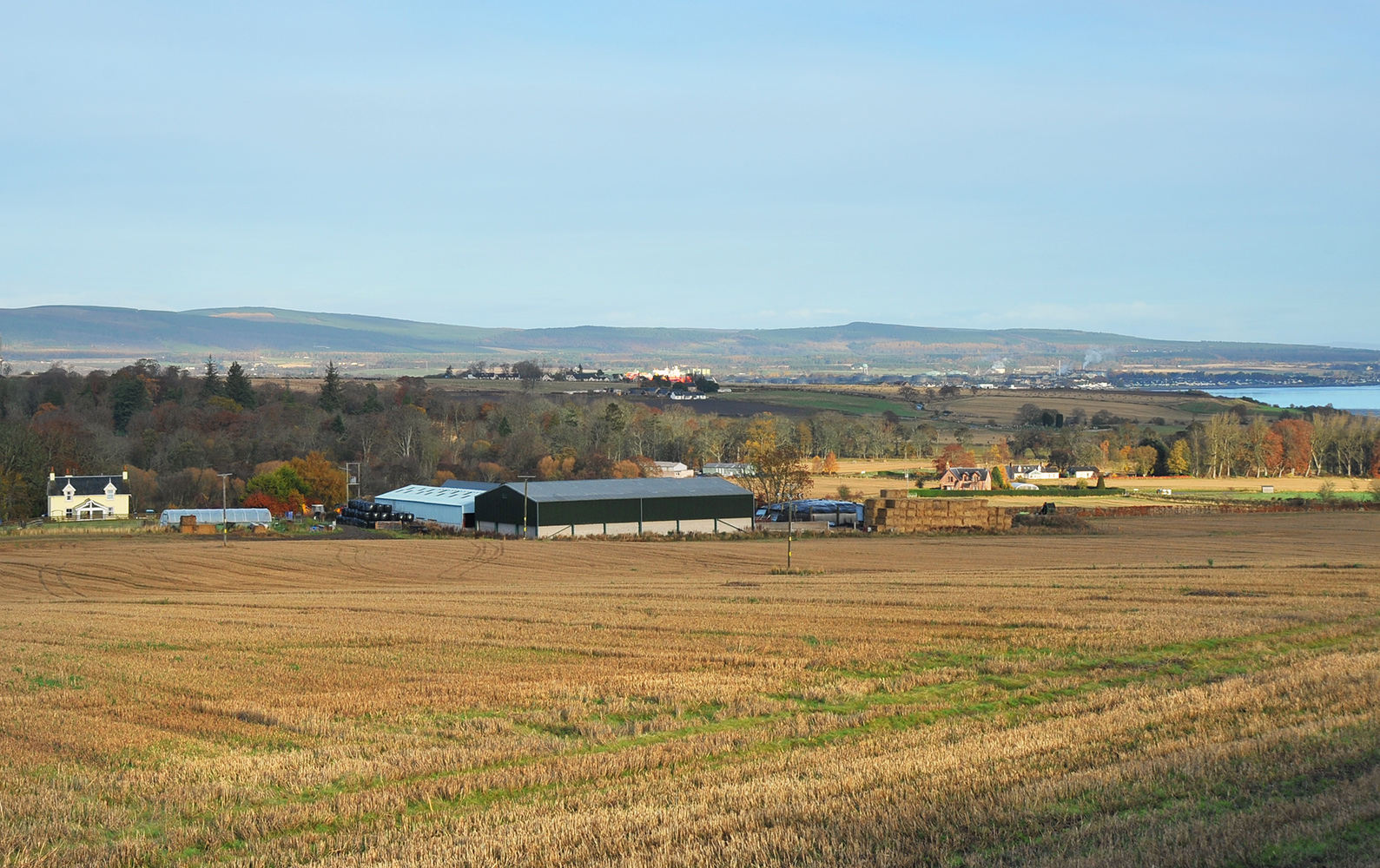
The arable lands of Ballicherry; photo by Andrew Dowsett
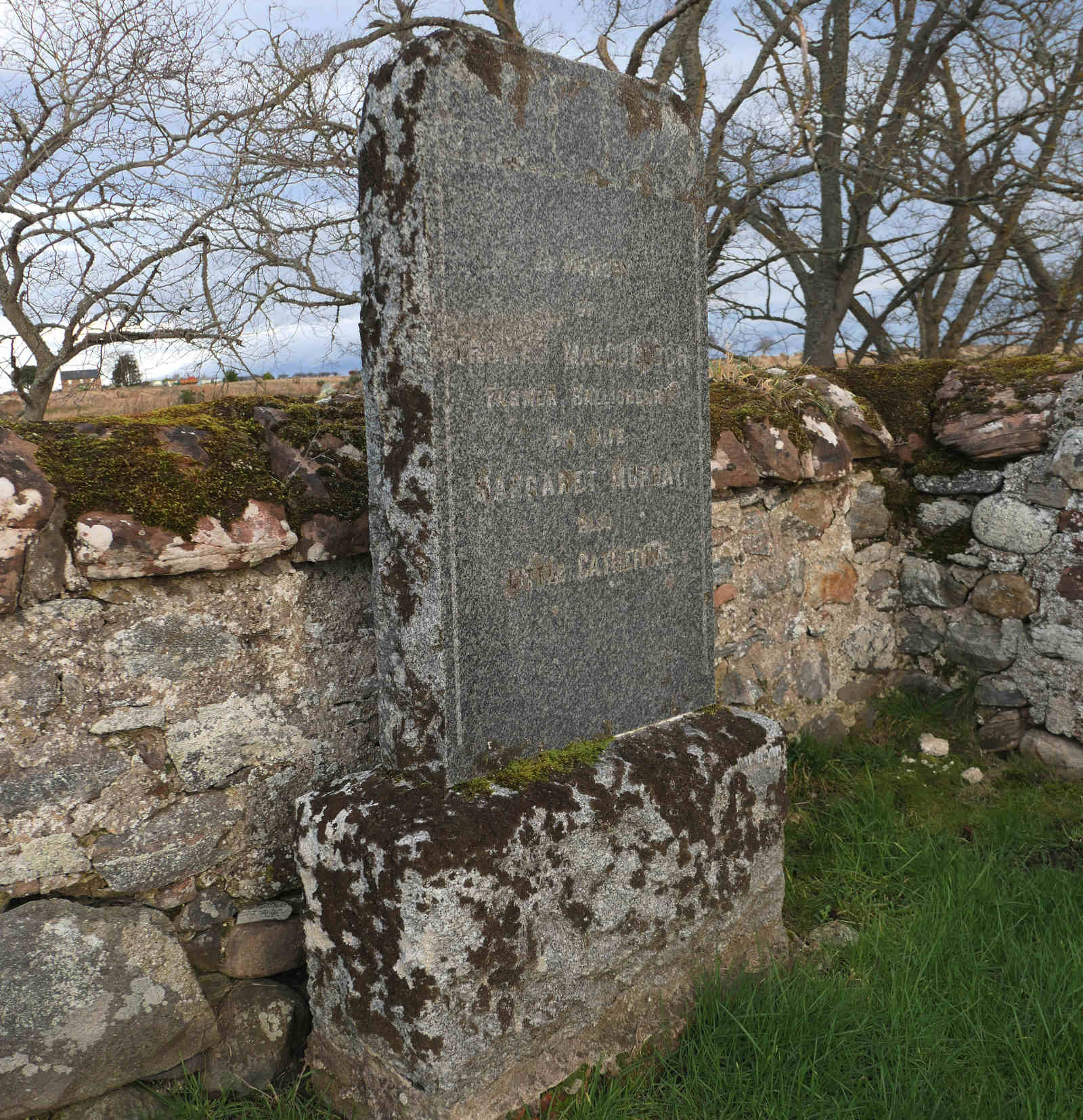
Memorial to Thomas MacCulloch and Margaret Murray of Ballicherry; photo by Jim Mackay
Easter Ross origins
There were many important McCulloch families in Easter Ross, and we do not know if the McCulloch forebears of Thomas and James Duff McCulloch were members of one of them. The earliest definitely-known family members were Andrew McCulloch farmer in Drumgilly and his spouse Anne Duff, on the Shandwick Estate in the parish of Logie Easter, to the east of modern day Invergordon.
There are various family trees to be seen on the internet showing the family going back to the Reverend William McCulloch of Whithorn, Dumfries, leader of the Gospel revival in Cambuslang in the 1740s. There doesn’t seem to be a shred of evidence supporting this, and it appears to be just one of the many fantasies that populate websites such as Ancestry. But if anyone has any hard evidence to back this up then let me know!
The Logie Easter baptism register contains records of five baptisms to Andrew McCulloch and Anne Duff, namely Jane (1775), Elspet (1777), William (1779), Andrew (1790) and Alexander (1792 ). At the baptism of Alexander, Andrew had become the tenant at Drummeddat (nowadays Arabella) rather than Drumgilly, so his tenancy had obviously run out between 1790 and 1792. In passing, I note that a couple of weeks before this Jane was baptised, another Jane McCulloch was baptised, to Thomas McCulloch tenant in Drumgilly and Isabel Gallie, almost certainly then a brother. That could be useful for those seeking to push the origins of the family further back.
The baptism of particular interest is that of Andrew:
Register of births Logie Easter 1790
25th March Andrew son to Andw. McCulloch Tent at Drumgilly & of Anne Duff was born
Young Andrew did not become a tenant farmer like his father, but instead became a journeyman mason. His base however remained firmly fixed in the parish of Logie Easter. He married Catharine Ross on New Year’s Day 1819 in the parish of Fearn and all his children were born in Logie Easter. They were Andrew (1819), Janet (1821), Anne (1824), William (1826), Thomas (1828), Alexander (1830), Margaret (1833) and James (1836). In each case he is given as mason at Calrossie except for the baptism of Janet, when he is given as “mason Loandou” (Loandhu). I think it likely this was just a different way of depicting his normal residence near Calrossie as they are in the same vicinity.
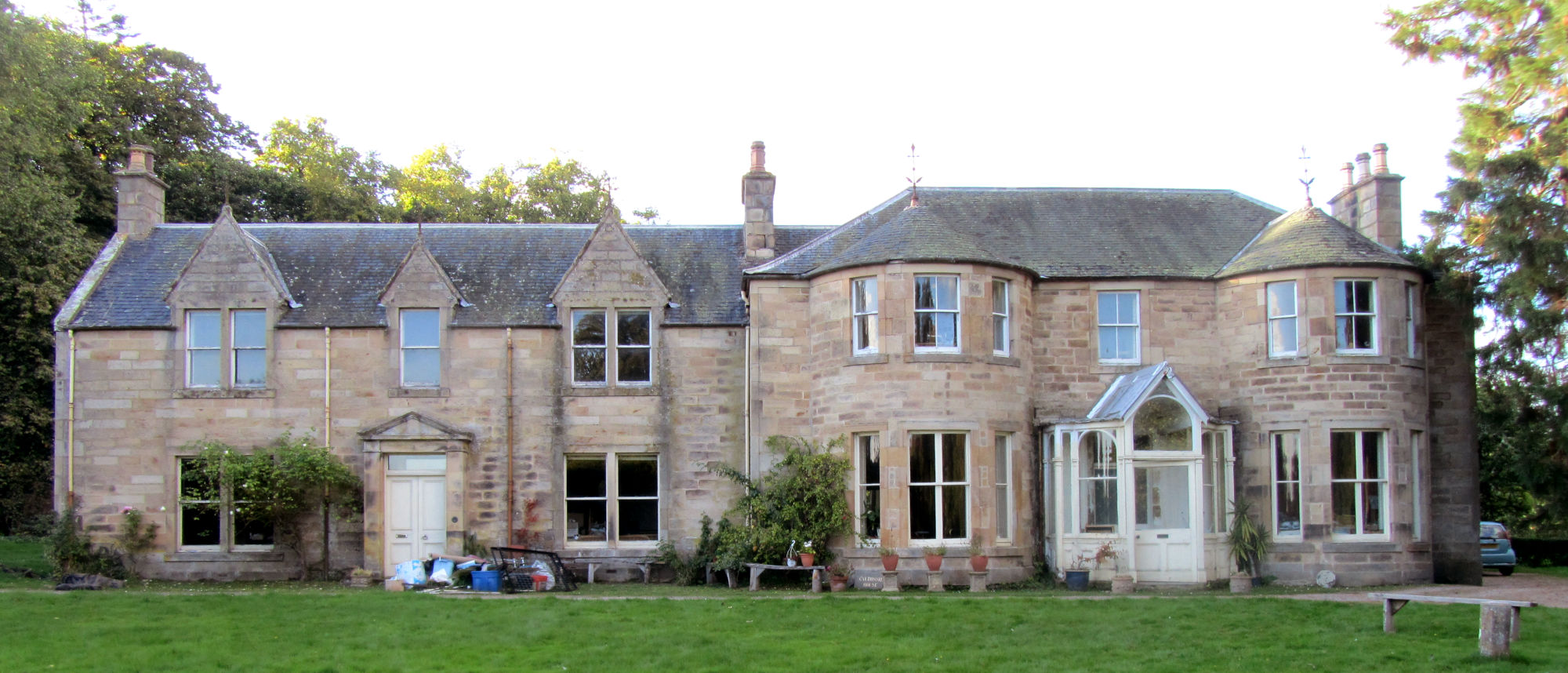
Calrossie House in 2015; the McCullochs lived close by; photo by Jim Mackay
Fearn Marriage Register
Andrew McCulloch in the Parish of Loggie and Katharine Ross in this Parish were married the 1st January 1819.
There was quite a gap between the births of the two children we are focusing on due to their Resolis and Kirkmichael connections, Thomas and James (Duff):
Logie Easter Baptism Register
1828 … March … 30th. Thomas son to Andw. McCulloch mason at Calrossie & to Cathr. Ross his lawful spouse was born
James son to Andrew McCulloch mason at Calrossie & to Catharine Ross his Wife was born 28th April 1836
There was a Catherine born later than the other children, about 1839, who does not appear in the baptism record, but does appear in the numerous family group in the 1841 census at Loandubh in the Parish of Logie Easter. The locations known as Calrossie and Loandhu are close to each other, just beyond the roundabout where the A9, after traversing much of the length of Easter Ross, turns north. I confess I do not know why the family location seems to alternate between Calrossie and Loandhu and I do wonder if sometimes they were given as equivalent locations. Calrossie House is in the parish of Logie Easter, but was the area of Calrossie considered to extend into the neighbouring parish of Fearn?
1841 Census Return, Londubh, Parish of Logie Easter
Andrew McCulloch Male 50
Catherine McCulloch 40
Andrew McCulloch 20 / Ann McCulloch 15 / William McCulloch 13 / Thomas McCulloch 11 / Alexander McCulloch 9 / Margaret McCulloch 7 / James McCulloch 5 / Catherine McCulloch 2
By 1851, the oldest son, Andrew, married by now to another Catherine, was residing at the parents’ location of Loandubh, whilst the parents and some of the other children were just a short distance away now at Balnagore in the Parish of Fearn.
1851 Census Return, Balnagore, Parish of Fearn
Andrew McCulloch Head Married 60 Mason born parish of Loggie
Catherine McCulloch Wife Married 50 born parish of Fearn
Janet McCulloch Daughter Unmarried 28 Dressmaker / Margaret McCulloch Daughter Unmarried 16 Ag Lab / James McCulloch Son 14 / Catherine McCulloch 12 Scholar
I have seen it suggested that the family had to move to Fearn parish because of its strong Free Church adherence, but this doesn’t fit with his son retaining the family tenancy.
The family connection with Loandhu continued for much longer, as I see that Catherine Graham (the daughter of Andrew McCulloch and Catherine Ross), born about 1839, died at Loandhu, Parish of Fearn, in 1919. The headstone commemorating Catherine stands in Kilmuir Easter burial ground.
Andrew died a few years later, and is buried in Nigg Old kirkyard, where he and his wife are commemorated by a headstone erected by his son Thomas in 1859, a couple of years after his father’s death in 1857. It is interesting to conjecture if the family had earlier connections with the parish of Nigg. Andrew’s spouse Catherine long survived him, moving to join her married daughter Catherine at Midoxgate nearby. Midoxgate and Balnagore are adjacent, and are a short distance to the east of Calrossie and Loandhu.
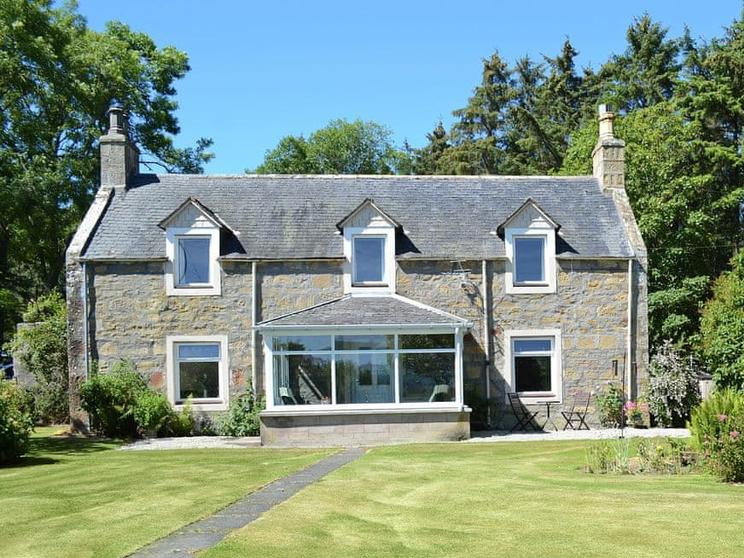
Old Midoxgate Farmhouse, Calrossie, Fearn, now a holiday home
The death certificates of Andrew and Catherine provide much information:
Fearn deaths register
Andrew McCulloch mason (master) (married) died 9 Nov 1857 Loandhu, Fearn age 67 parents Andrew McCulloch farmer (d) Ann McCulloch ms Duff (d) Consumption Several years No regular medical attendant Buried Churchyard of Nigg as certified by Jaspard Graham undertaker informant David McKenzie neighbour (present)
Fearn deaths register
Catherine McCulloch (widow of Andrew McCulloch mason (journeyman) died 18 Apr 1883 Balnagore Fearn age 85 parents William Ross farmer (d) Janet Ross previously McDonald ms Duff (d) Old age 2 years No medical attendant informant Angus Graham son-in-law (present)
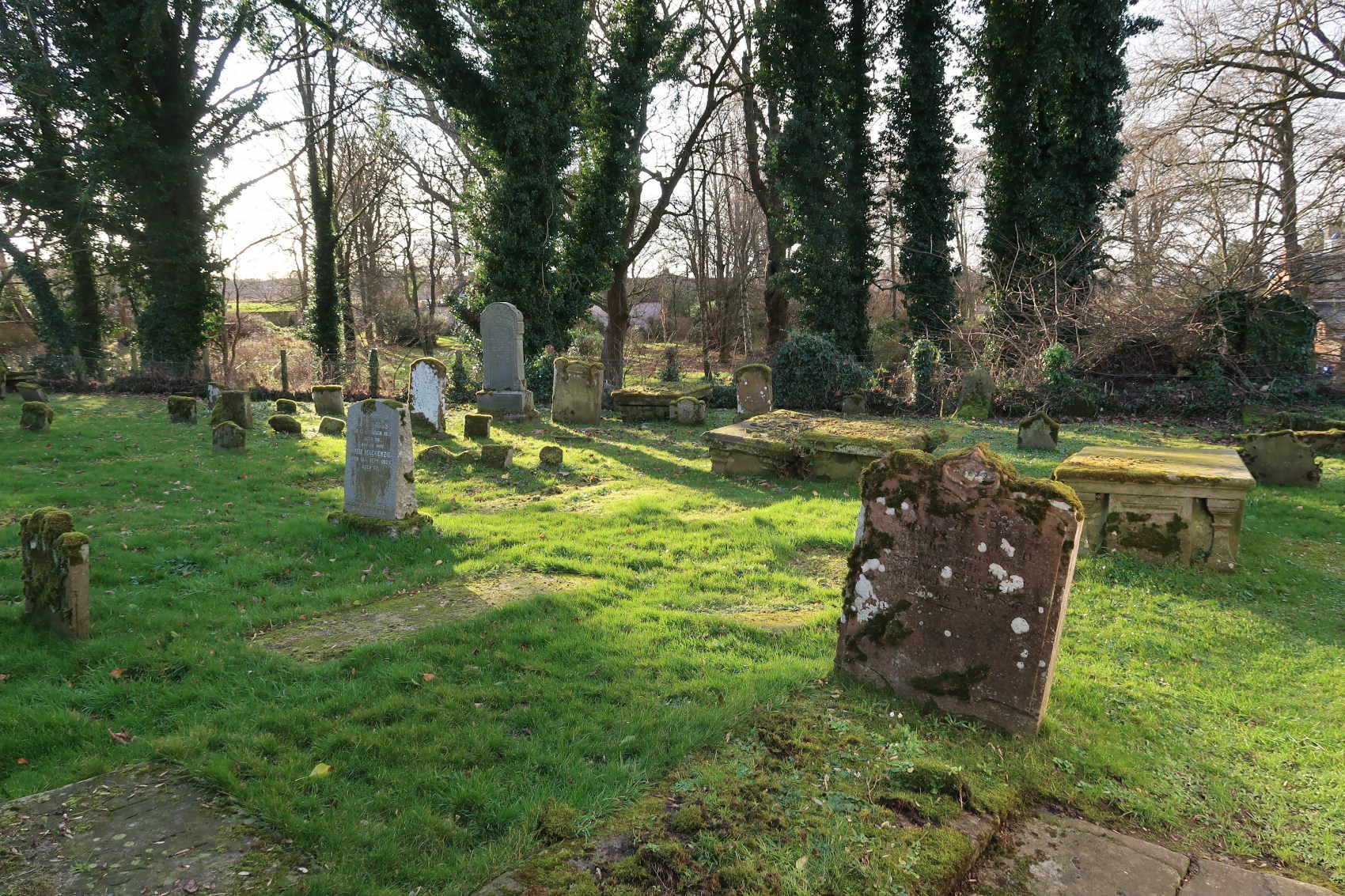
McCulloch headstone in Nigg Old kirkyard; photo by Davine Sutherland
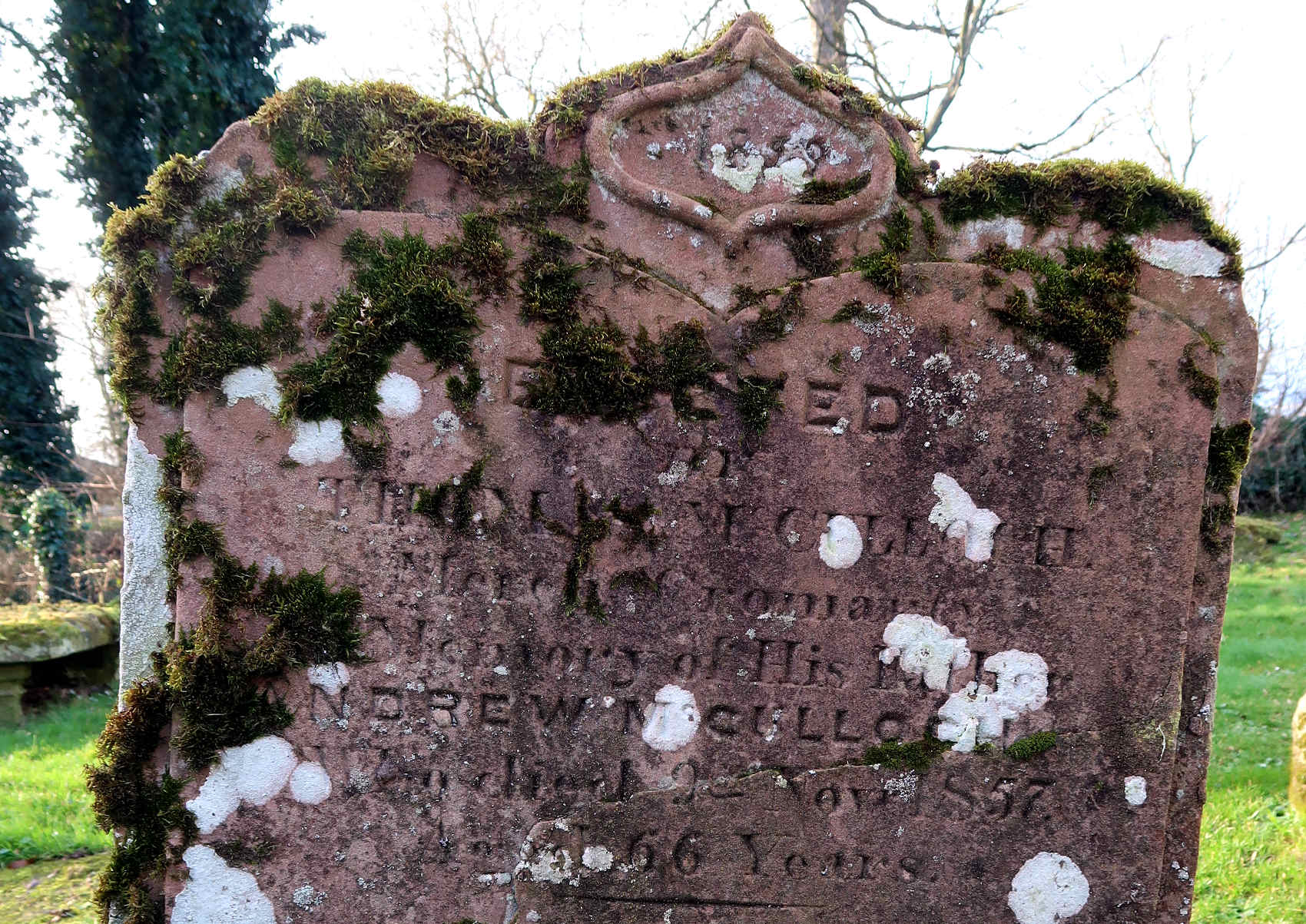
photo by Davine Sutherland
You will note from these that there was a Duff connection on both sides of James Duff McCulloch’s family.
Thomas Ross McCulloch (1828–1900), merchant in Cromarty and farmer in Ballicherry, Bayfield and Fload
and his spouse Margaret Murray (c1833–1920)
Thomas became a merchant, based in Cromarty. It was he who caused a headstone to be erected in 1859 in honour of his father, who had died in 1857. The inscription reads:
1859 / Erected/by THOMAS McCULLOCH / mercht Cromarty / in memory of his father / ANDREW McCULLOCH / who died 9 Nov. 1857 / aged 66 years.
He had become a draper, a woollen draper, which seems an unusual step given his father was a mason and the family line seems to have been farming. However, it was as a draper that he married Margaret Murray in 1861.
28 February 1861 At Balacherry, After Banns, according to the forms of the Free Church of Scotland
Thomas McCulloch draper (bachelor) 28 usual residence Cromarty parents Andrew McCulloch farmer (d) and Catherine McCulloch ms Ross
Margaret Murray (spinster) 28 usual residence Balacherry Resolis parents David Murray farmer and Elizabeth Murray ms Macintosh
Dond. Sage, Minr. Alexander Murray Thomas Ross [witnesses]
The newspaper report reveals that Margaret was the daughter of the farmer at Ballicherry:
Inverness Courier 14 March 1861
Ballacherry Cottage, the 28th ult., by the Rev. D. Sage, F.C., Resolis, Mr Thomas Macculloch, Merchant, Cromarty, to Margaret, second daughter of David Murray, Esq., Farmer, Ballacherry.
In the census return a few months later, both Thomas and Margaret were shown to be visitors at Ballicherry although they were going to become residents in due course:
1861 Census Return, Ballicherry Farmhouse, Parish of Resolis – house with 8 or more windows
David Murray head married 60 farmer of 175 acres born Sutherlandshire
Eliza Murray wife married 55 farmer’s wife born Aberdeen
Davidina Murray daur unmarried 22 born Cromarty
Thomas McCulloch visitor married 28 woolen draper born Ross shire
Margaret McCulloch daur married 28 woolen draper’s wife born Cromarty
Margaret Grant visitor unmarried 35 born Ross shire
Catherine McDonald servt unmarried 45 domestic servt. born Sutherland
Eliza Bain servt unmarried 19 domestic servt born Cromarty
You can see from this that David Murray was no small scale crofter. Whilst they were resident as guests at Ballicherry at the time of the Census in 1861, Thomas maintained his trade as a draper in Cromarty, and it was there that their first child was born later that year:
Cromarty birth register
Andrew Thomas McCulloch born 8 December 1861 parents Thomas R. McCulloch draper Margaret McCulloch ms Murray married 28 February 1861 Ballachary Resolis informant Thomas McCulloch father present
In 1862 or 1863, David Murray gave up farming at Ballicherry and his son-in-law took over. This was a big step from a draper to managing a large farm. But by the time of their second child that was the position:
Resolis birth register
David Murray McCulloch born 5 August 1863 at Ballecherry parents Thomas McCulloch farmer Margaret McCulloch ms Murray married 28 February 1861 Ballecherry, Resolis informant father present
Thus, when it was time for the 1871 Census, Ballicherry was occupied by the burgeoning McCulloch family:
1871 Census Return, Ballicherry, Parish of Resolis – house with 9 windowed rooms
Thomas McCulloch head married 38 farmer of 200 acres employing 5 men and 4 women born Loggie
Margaret McCulloch wife married 38 born Cromarty
Andrew T. McCulloch son 9 scholar born Cromarty / David M. McCulloch son 7 scholar born Resolis / Thomas R. McCulloch son 5 born Resolis / Eliza M. McCulloch daur 3 born Resolis / Catherine McCulloch daur 1 born Resolis
Jessie McKenzie servant unmarried 23 nurse maid born Knockbain / Catharine McLean servant unmarried 20 servant (general) born Roskeen
Poor little Catherine, aged 1 in 1871, died in 1875, and is commemorated on her parents’ headstone in Kirkmichael. It obviously made a serious impact on the family.
Unlike other farming McCullochs in Resolis, who kept a low profile, Thomas had a more prominent presence. He was a member of the Road Trustees for the County. He was an elder in the Free Church (as had been his father-in-law, David Murray of Ballicherry). Thomas as ruling elder attended gatherings of the Synod, no doubt meeting up with his brother, the Reverend James Duff McCulloch. He was voted onto the Resolis School Board for the first time in 1879, beating several other worthies. At this time, the School Boards were highly politicised and the struggle for crofters’ and tenants’ rights and the religious divide between the Free Church and the Church of Scotland were reflected in those standing for election.
We see that in a musical evening in Newhall school in 1879 that “Mr Macculloch, Ballicherry, discharged the duties of chairman in genial manner.” (Ross-shire Journal, 28 February 1879). There are reports of similar events with Thomas acting in this role. And at a Sunday schools soiree, it is reported that “Mr Macculloch, Ballicherry, submitted a very interesting report of the Sabbath schools, giving a sketch of the work that is being carried on” (Ross-shire Journal, 16 April 1880), indicating his involvement in church activity.
By the Census return of 1881, his older children had flown the nest, but there were still plenty at home. The return shows that he and his two servants spoke Gaelic.This was to be his last census in Resolis.
1881 Census Return, Ballicherry, parish of Resolis – house with eight rooms with one or more windows
Thomas McCulloch head married 48 farmer of 185 acres of which 175 are arable, employing 5 men and 4 women born Logie
Margaret McCulloch wife married 48 farmer’s wife born Cromarty
David McCulloch son unmarried 17 farmer’s son born Resolis / Thomas McCulloch son 15 scholar born Resolis / Eliza McCulloch daur 13 scholar born Resolis / Alexdr. McCulloch son 7 scholar Resolis
Mary Matheson servt unmarried 18 domestic servt general born Resolis / Christina Urquhart servt unmarried 20 farm servt born Gairloch
You see Ballicherry often mentioned in the papers at this time in stock sales, but you also see the farm offering winter let of the whole farm. One example:

Northern Chronicle and General Advertiser for the North of Scotland, 7 September 1881
Thomas now had a member of his family as a close neighbour. I see that the Valuation Rolls of 1881 record that the owner of land, house and mill at Gordon’s Mill was now the Reverend James Duff McCulloch, so Thomas’s brother had a prominent presence in the area, a proprietor of land and a distinguished churchman.
Ballicherry was a farm on the Poyntzfield Estate, and I note that to Thomas fell the task of promoting the laird’s family on social occasions. For instance:
Northern Chronicle and General Advertiser for the North of Scotland 9 May 1883
Coming of Age of the Heir of Poyntzfield Estate.– In connection with this event, a few of the tenants on the estate met at Poyntzfield Arms Inn, Jamimaville, to drink the health of the young laird of Poyntzfield, George G. Munro, Esq. Among those present were – Mr M’Culloch, Ballicherry; Mr Kenneth Mackay, Poyntzfield Mills; Mr Forbes Jamimaville … Mr M’Culloch was called to the chair. Wine and cake being placed on the table, the Chairman proposed the health of Mr Munro of Poyntzfield, and wished him long life and happiness. This was most heartily responded to. [The usual multitude of toasts followed, a very popular activity.] At the close of proceedings, Mr Gibson proposed a vote of thanks to Mr M’Culloch for his conduct in the chair. Flags were displayed from almost every house in Jamimaville, also at Poyntzfield House and square, Newhall Bridge, Ballicherry, Ardoch, and Mr H. Macpherson’s, Poyntzfield. Illuminations were kept up at Poyntzfield House and Jamimaville, and rejoicings at Wood of Brae. Mr William Campbell, with the assistance of Mr M’Culloch, Ballicherry … got up a large bonfire at Wood of brae, which was set on fire by Mr Campbell in presence of a large company, including a number of tenants and friends. Afterwards, Mr Campbell, Wood of Brae, proposed the health of Mr S. Munro of Poyntzfield, wishing him long life and happiness. The toast was received with ringing cheers. Other healths followed. Dancing was then engaged in, and songs given in good style.
In only a few years the relationship between landlord and tenant in the area was to become very fraught, but clearly at this time the relationship at Poyntzfield was amicable. This was definitely the case when to Thomas fell the task of proposing the health of the laird at a union of two proprietor families, as reported in the Northern Chronicle and General Advertiser for the North of Scotland of 23 January 1884:
Marriage Rejoicings at Braelangwell.– The marriage of Captain Lyon-Mackenzie of Braelangwell with Miss F.E. Munro, second daughter of the late Captain Munro of Poyntzfield, took place in London on Monday. To celebrate the happy event, a large bonfire was erected on Aultdinnie (on the farm occupied by Mr Underwood, Braelangwell), by Mr Thomson, manager, Braelangwell, and others. A large gathering of people turned out to witness the lighting, and about half-past six o’clock in the evening, Mrs Thomson, Braelangwell Lodge, set fire to the large pile, which in a few moments was in full blaze. Mr Thomson, Braelangwell, then proposed the health of Captain Lyon-Mackenzie and his young bride, and the toast was drunk with great spirit. Mr M’Culloch, Ballicherry, proposed the health of Mr Munro of Poyntzfield; and the healths of Mrs Munro of Poyntzfield and family, and of the Misses Lyon-Mackenzie of Braelangwell, were drunk with great enthusiasm.
Those toasts were always drunk with great enthusiasm. Thomas was still a member of the School Board when it became involved in the acrimonious dispute with the laird of Newhall over the ownership of the old school at Newmills. The School Board won the legal battle, but the sale of the site thereafter did not at all cover the legal costs involved, a matter of great embarrassment to everyone concerned. I do not know if that contributed to Thomas’s decision to move back to Easter Ross or if he simply fancied a change of tenancy. Whichever, in 1887 he secured a lease at Bayfield in Easter Ross, not far from the family’s old tenancy at Calrossie, and they moved out in 1888.
The Scotsman of 18 March 1887, and other papers covering agricultural news, reported that “Mr Thomas M’Culloch, Ballicherry, has entered upon a lease of Bayfield, near Nigg, at 25s. per acre.” I note that that rent was more than similar farmland being let at that time, so perhaps he was anxious to get hold of Bayfield for personal reasons.

The Scotsman 18 March 1887 announcing that Thomas MacCulloch had secured the lease of Bayfield
The tenancy of Ballicherry was snapped up at greatly reduced rates.

The Ross-shire Journal 13 April 1888
The displenishment at Ballicherry took place on 17 May 1888, and the scale of the enterprise carried on by MacCulloch can be seen in the advertisements of the time:
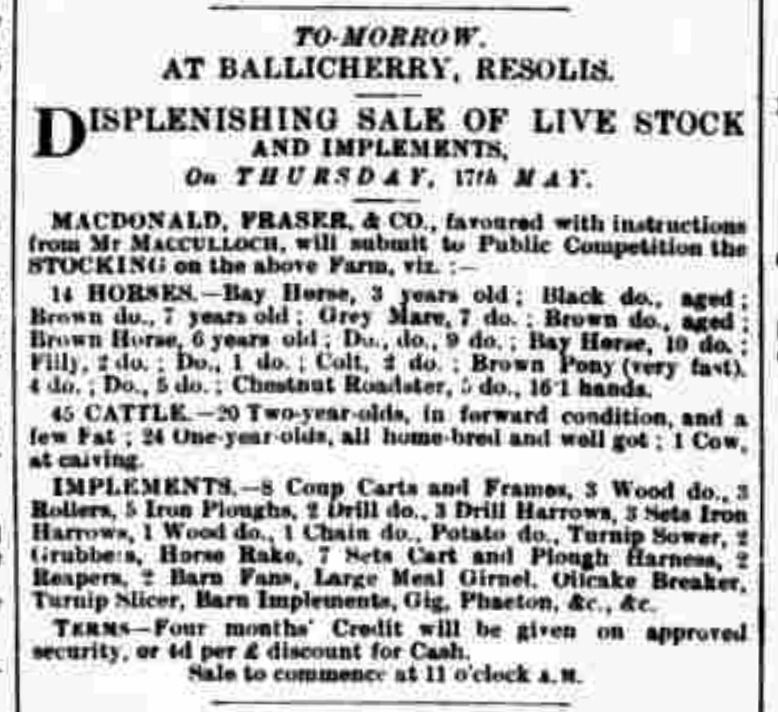
Ballicherry displenishment being advertised in The Northern Chronicle and General Advertiser for the North of Scotland 16 May 1888
Bayfield
I have not followed Thomas’s time at Bayfield in any detail, but I do see he was called to give evidence at a celebrated legal proceeding of the time known as the Easter Ross Manure Case. It was heavily reported in the press, and was the attempt by Murdo Mackay, the previous farmer at Bayfield Mains before Thomas McCulloch, to obtain compensation from the landlord, John Humphrey of Bayfield, for the value of 301 cubic yards of manure left by Mackay on the farm of Bayfield at his outgo. Mackay had won his case at the Sheriff’s Court, but Humphrey had appealed to the Court of Session. Curiously, it was Thomas McCulloch’s son who gave evidence, and it appears that the tenancy had been taken in the name of Mrs McCulloch and not Thomas himself. One tiny snippet from the appeal at the Court of Session (Inverness Courier, 13 March 1888).
Thomas Macculloch, jun., Bayfield, was next examined. In answer to Mr Dallas, solicitor, he said that his mother took the farm of Bayfield after Mr Mackay, at a rent of £220. They took over 873 cubic yards of manure. This year the extent of the green break was 43 acres, including the Carse land. They manured 10 acres in the Carse, but they did not manure it with farm-yard manure. By the measurement of the fields, about twenty-seven loads of manure to the acre was applied. Q.– Were you anxious to take over this manure now in question? A.– Not at all. The season was so late before they required to put down the Carse turnips that they did not require it. They put down the Carse turnips about the end of June. It would be too late to wait for the manure because the turnips would be too late in growing. They put artificial manure on the Carse turnips in order to make them come quickly up. He did not consider that the farm was in a high manorial state when they entered, but he would not express an opinion as to the manorial value of the farm. They put down a crop of wheat on a twenty-acre field which was previously under oats. They wanted to get the farm into the five-course shift of rotation. He thought his mother was not willing to take over the manure in question. He did not hear his father say that it would be better to take over the manure.
In passing, I note the outcome of this case: “the pursuer [Mackay] agreed, if defender [Humphrey of Bayfield] would withdraw his appeal, to accept £30 in full of his claim, with £40 towards his expenses – the defender to get the whole of the manure. The expenses in the case, we understand, are very heavy, the pursuer’s alone amounting to over £120.” Given that the value of the manure was estimated at £90 you can see that the only winners in this case were the lawyers.
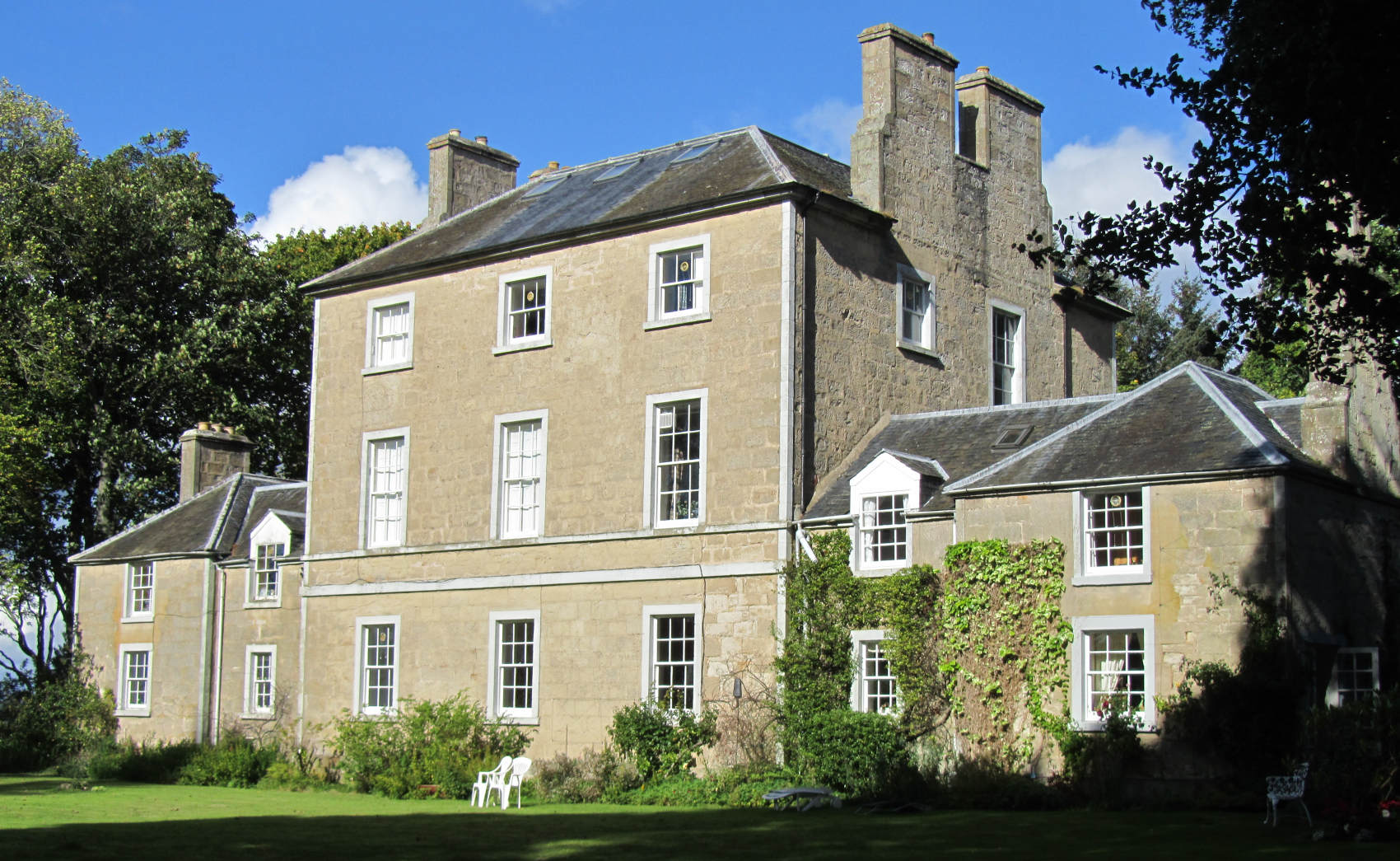
Bayfield House; the farmhouse was nearby; photo by Jim Mackay
The Census Return for Bayfield in 1891 shows the only family still in household with Thomas and Mary was Eliza Murray McCulloch, their unmarried daughter, incorrectly listed as born in Nigg when, of course, she had been born in Resolis.
Later in that year of 1891, Thomas MacCulloch was in court again, not as a witness but as a member of the jury in “the Fearn Poisoning Case”. One George Grant, of Mounteagle, Fearn, was accused of knowingly permitting his next-door neighbour, Charles Ross, to drink carbolic acid thinking it was whisky. It was a challenging case, and Thomas as a juryman sought clarification from one witness himself. The Sheriff sent the jury back to re-consider their first decision, and eventually Grant was given a three months’ jail sentence. For full details see, for instance, the Inverness Courier of 25 September 1891.
Fload
The family were soon to be on the move again, with their next farm on the north side of the Dornoch Firth, not far from the Meikle Ferry. The farm was Fload, in Sutherland, on the Skibo Estate. I don’t know when they moved in, but I see Mrs McCulloch advertising for a contractor to repair the buildings in 1896. This from the Inverness Courier of 13 March 1896:
Sutherlandshire – Skibo Estate. To Contractors.– Offers Wanted for Mason, Carpenter, and Slater Work of Improvements and Additions to Fload Steading. Mrs Macculloch, the Tenant of the Farm, will show Plan and Specification to intending Offerers. Offers to be sent to C.M. Cameron, factor, Balnakyle, Munlochy, up to 21st. curt.
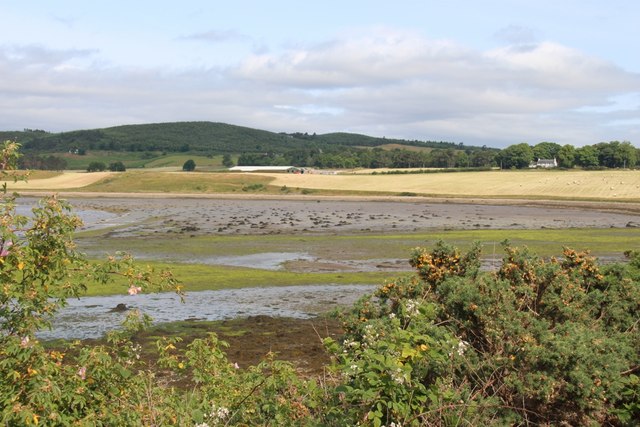
Fload Bay on the Dornoch Firth; photograph copyright Alan Reid and licensed for reuse under Creative Commons Licence
Thomas had long acted as an elder in the Free Church, but we see this side of him developing:
Ross-shire Journal 27 August 1897
Mr Macculloch, farmer, Fload, officiated with much acceptance, in the Edderton Free Church on Sunday, in room of the Rev. Mr Forbes, who is presently from home.
This was not the only time he officiated in place of the minister and one has to wonder if he had not been tempted during his life to follow the example of his minister brother, James Duff McCulloch.
The Skibo Estate is, of course, famous as the home of millionaire steel magnate and philanthropist Andrew Carnegie. He had purchased Skibo around the same time as the McCullochs had moved north. Carnegie took Skibo in 1897 on a one-year lease, with an option to buy, an option he took up in 1898. On his first visit to the north since Skibo Castle had been renovated for him, who should be one of the organising committee and the first welcoming resident but Thomas Macculloch.
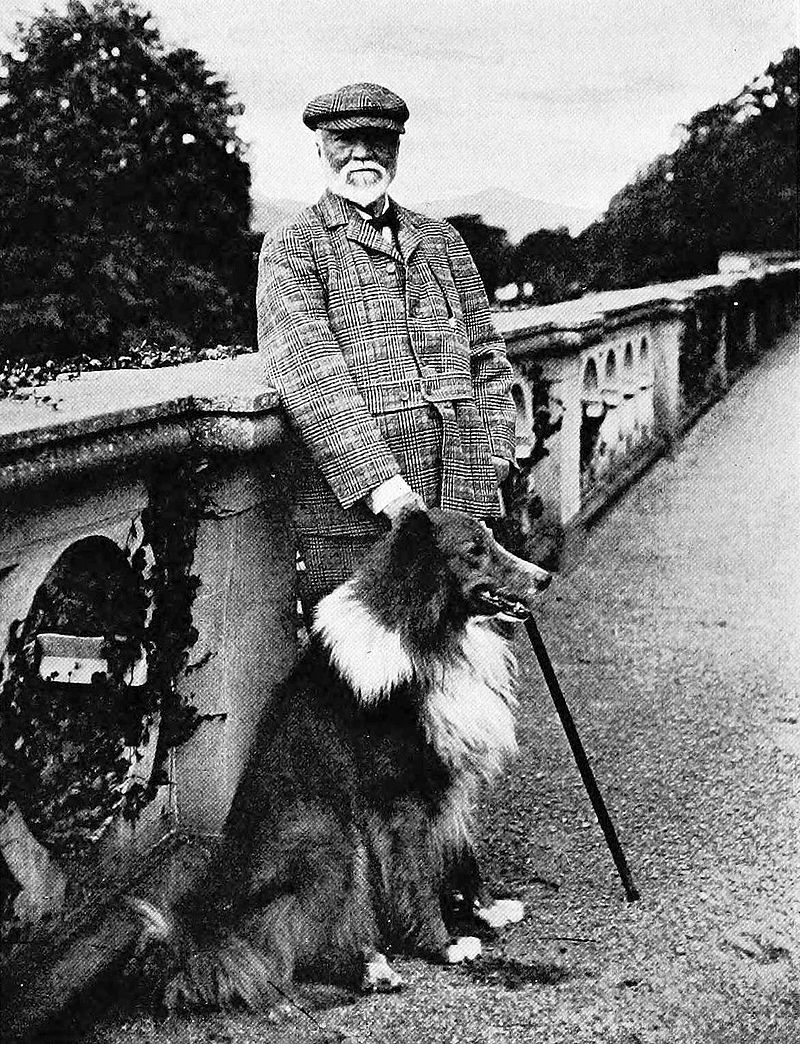
Andrew Carnegie at Skibo in 1914, from Wikipedia, Creative Commons licence
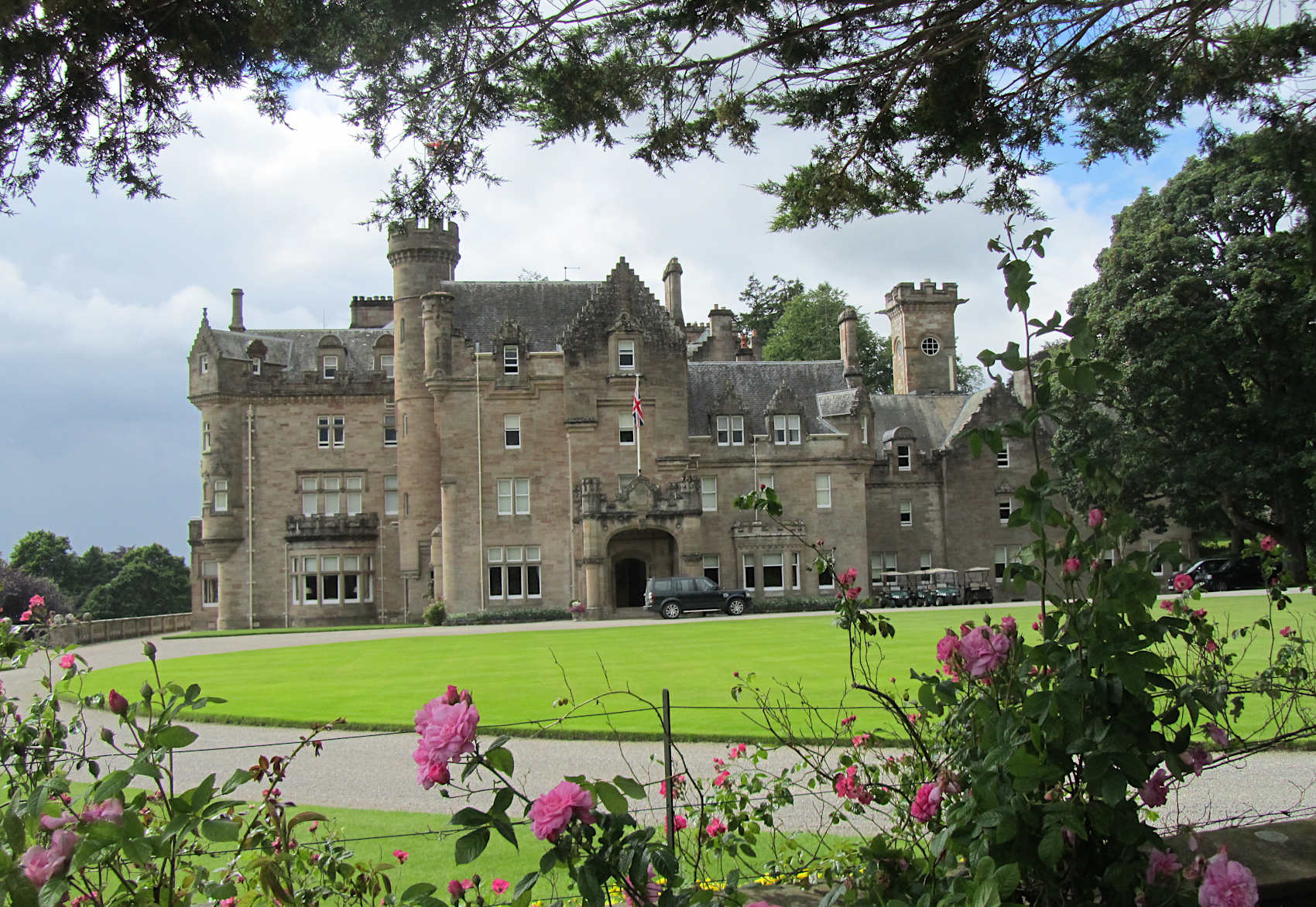
Skibo Castle; photo by Jim Mackay
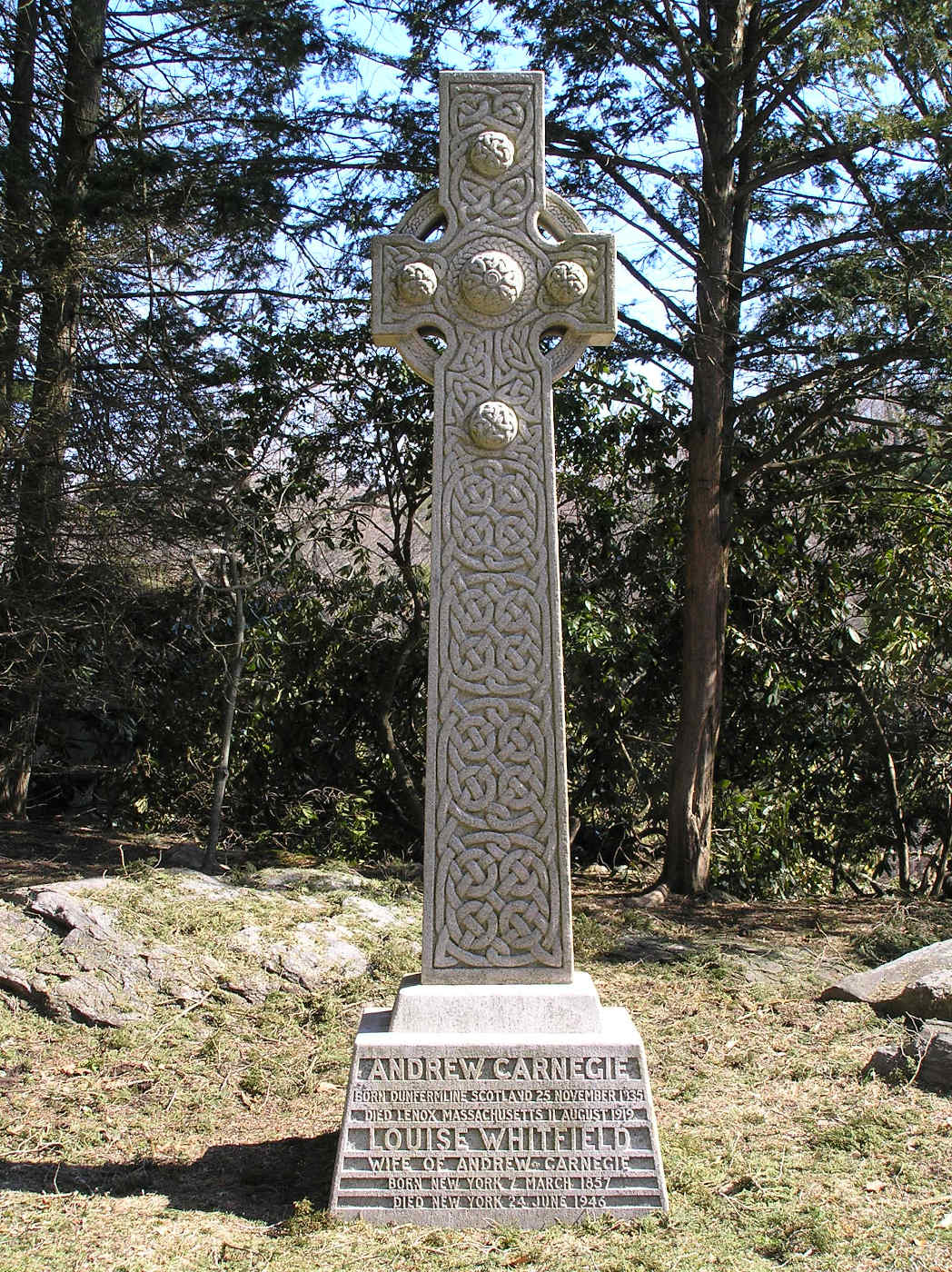
Andrew Carnegie’s own distinctive memorial, from Wikipedia, Creative Commons licence
Thomas did not stint his praises. This from the Ross-shire Journal of 19 May 1899:
Mr Carnegie’s Arrival at Skibo. An Enthusiastic Reception. Mr Andrew Carnegie of Skibo arrived at Skibo Castle on Wednesday, accompanied by Mrs Carnegie and their infant daughter. They arrived by a special saloon attached to the 11.55 a.m. train due at Ardgay station. They were met at the station by Mr Maclean, factor. In an open carriage, drawn by a spanking pair of horses, they drove right on to Skibo without either halting at the village of Bonar or any other place en route. Between Bonar-Bridge and Skibo flags waved from many of the house-tops, and at a cottage adjacent to the roadside there was inscribed on a wooden erection in bold letters, “Welcome to your Highland home.” Mr and Mrs Carnegie must have been much struck with the cordial welcome extended to them, more especially as it was only now for the first time that they entered the Castle since final adjustments were made of buying the estate. … At the commencement of the policies of Skibo a large crowd awaited the arrival of Mr and Mrs Carnegie, and when the horses pulled up hearty cheers were raised, and warm and cheering welcomes exchanged. Mr Macculloch, Fload, said that they were met to welcome Mr and Mrs Carnegie and their little daughter home to Skibo, their Highland estate. (Cheers.) They were very pleased to see them back safe, and it was their sincere hope that they might be spared for many years, and have great pleasure and happiness in Skibo Castle. (Cheers.) He could assure Mr Carnegie that they were proud of having him as their landlord, a gentleman whose name was not only a household word in Scotland, but also in England and America. (Cheers.) He did not wonder this being so, if they considered the large sums which he had given of his means for different objects which were for the good of his fellow creatures. (Cheers.) He spoke the sentiments of every one on his property when he said that it was their hope and wish that the Lord would vouchsafe to him and his household every blessing which maketh rich for time and eternity. (Applause.) Mr William Macleay, feuar, Clashmore, said that he had much pleasure in name of the feuars…
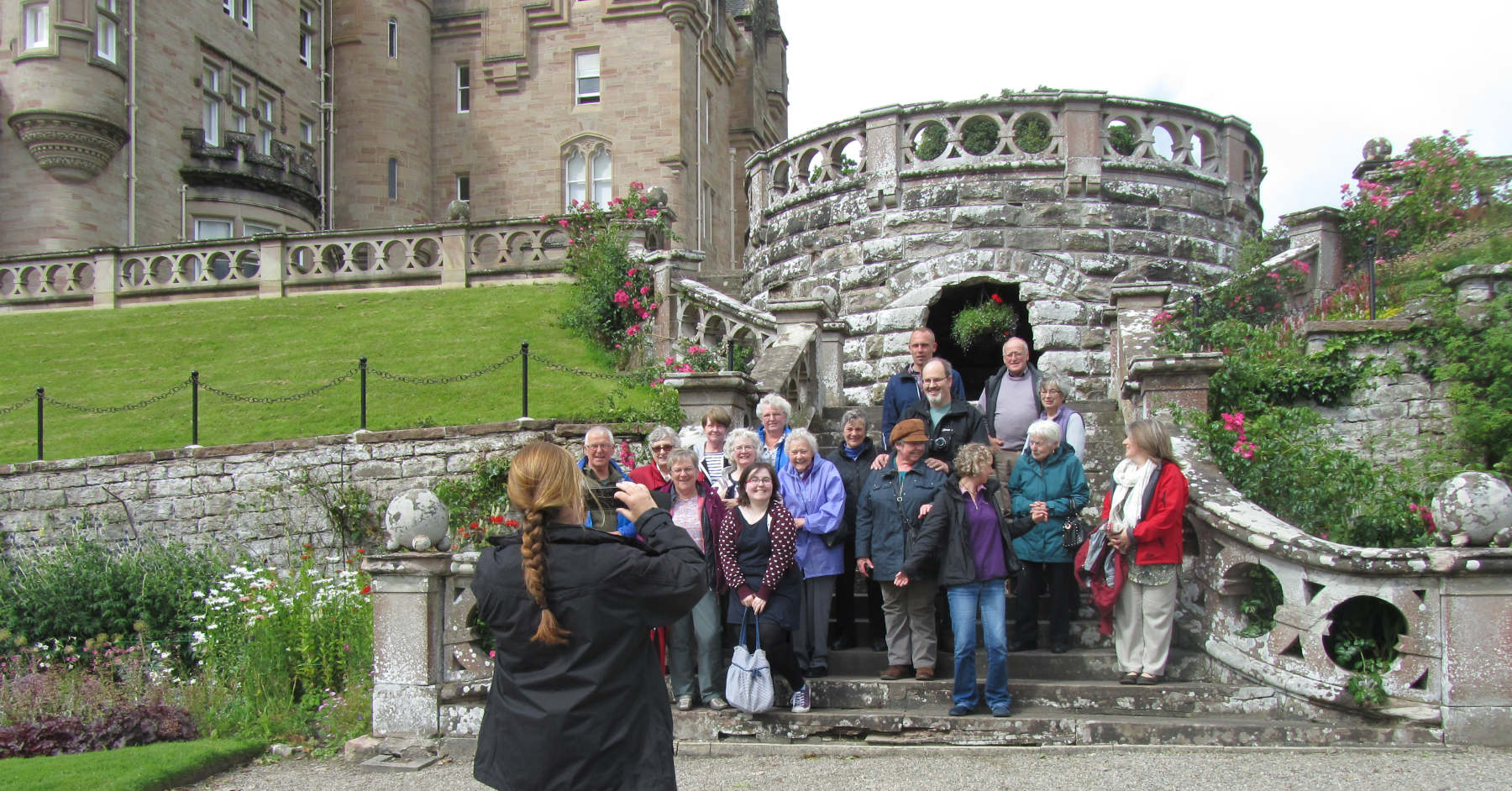
a visit to Skibo by Alness Horticultural Society (and a few Friends of Kirkmichael); photo by Jim Mackay
Alas, while Thomas had wished the Carnegies to be spared for many years, he himself was to die within the year. He passed away within a couple of days of being struck down by pneumonia and cardiac failure. His son informed the registrar at Bonar (and got the Christian name of his own grandfather wrong):
Thomas Macculloch farmer married to Margaret Murray died 2 April 1900 at Fload Bonar aged 70 parents Adam [sic] Macculloch mason (d) Catherine Macculloch ms Ross (d) informant A.T. McCulloch son present
The following year, then, the Census return for Fload showed a sadly depleted family:
1901 Census Return, Fload, Creich, Bonar, Sutherland
Margaret McCulloch Head Widow 70 Farmer born Cromarty
Eliza M McCulloch Daughter Single 31 born Resolis
Alexander M McCulloch Son Single 27 1874 Farm Manager born Resolis
Margaret survived through to 1920. At this time she was living in the village of Helmsdale, on the coast, and her son was residing in London. He again mucked up the registration process. He managed to forget the Christian name of his grandmother (Elizabeth), and confused the occupation of his maternal grandfather (farmer) with that of his own father as a young man (draper) on informing the Registrar of her death. Not the most reliable of informants.
Margaret McCulloch widow of Thomas Ross McCulloch farmer died 14 Jan 1920 at Helmsdale age 88 parents David Murray draper [sic] (d) [blank] Murray ms McIntosh (d) informant A.T. McCulloch son residence 8 Sellom Avenue, Harlesden, London NW
A grey granite headstone was erected in Kirkmichael:
In memory / of / THOMAS MACCULLOCH, / Farmer, Ballicherry. / His wife / MARGARET MURRAY. / Also / little CATHERINE.
The wording suggests that Thomas had purchased the plot at Kirkmichael whilst at Ballicherry. It is a very unusual headstone in that it bears no dates or ages, and it mentions him in the context of being the farmer at Ballicherry but makes no mention of the later farms of Bayfield and Fload.
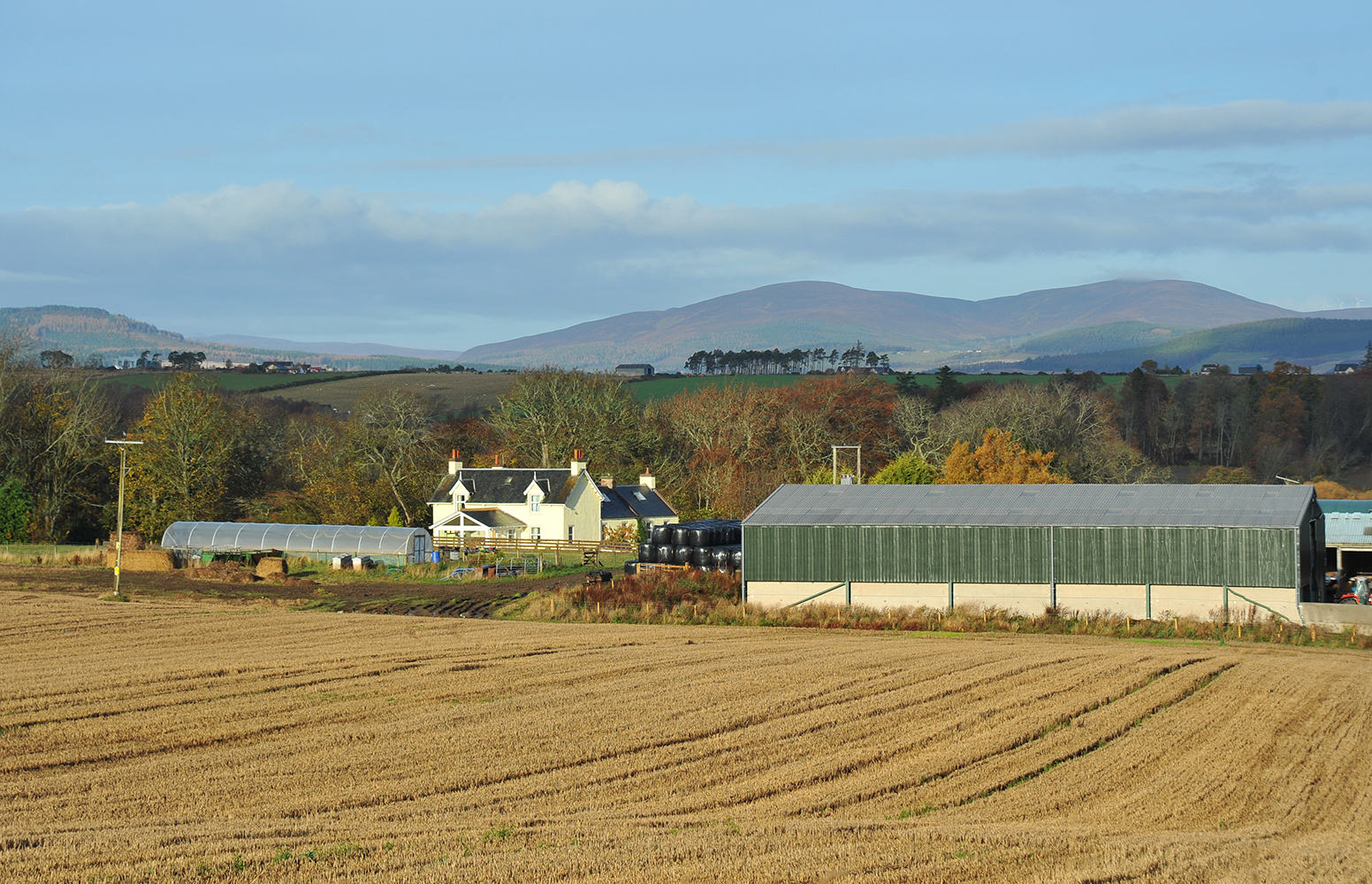
The farmstead of Ballicherry; photo by Andrew Dowsett
One of the more unusual stones within Kirkmichael. Was it erected by the son, Alexander Thomas McCulloch, or perhaps by the brother, the Reverend Dr James Duff McCulloch, who resided some of the time near Kirkmichael at Gordon’s Mills?
James Duff McCulloch (1836–1926)
I reproduce here the information presented on Reverend McCulloch on our page about the Clark family of Gordon’s Mills here. This was written before we realised the family connection with Resolis and Kirkmichael through his brother Thomas who held Ballicherry and whose memorial stone stands beside the north dyke in Kirkmichael. I have added some supplementary material gleaned from a small publication on the Glasgow Hope Street Free Church kindly loaned to me by James Holm of Easter Ferryton.
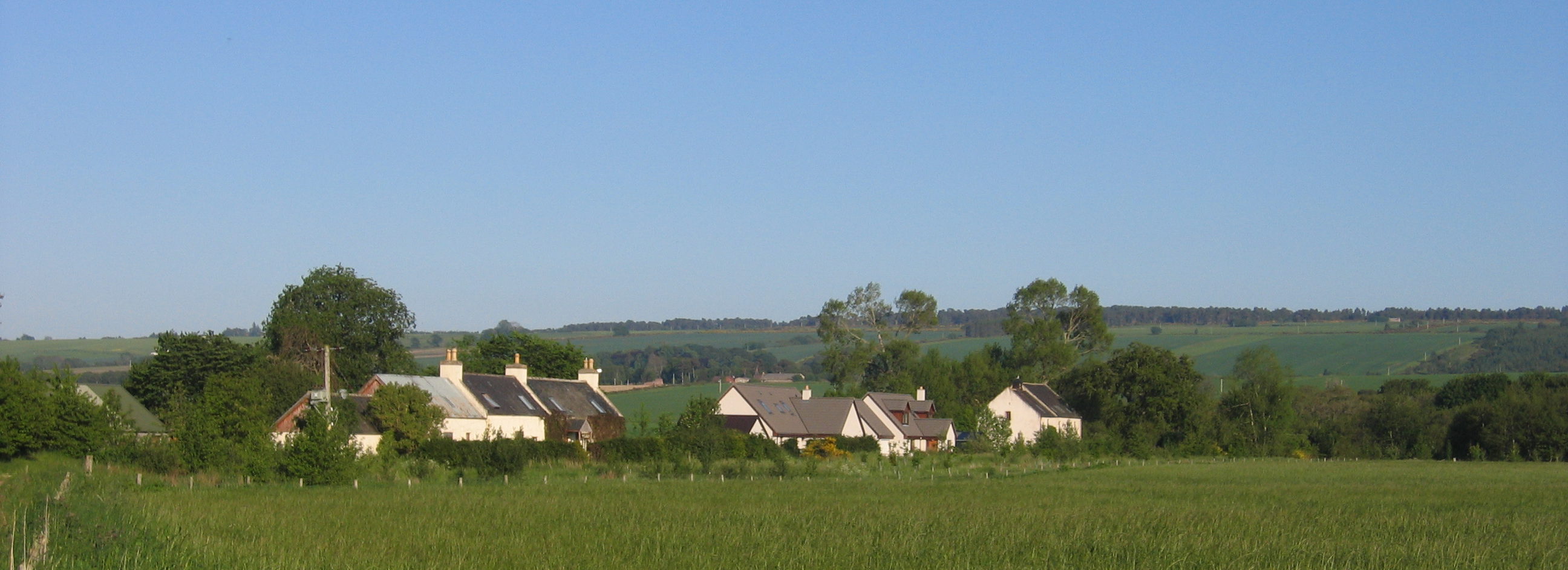
Hamlet of Gordon’s Mills, owned by Reverend James Duff McCulloch; photo by Jim Mackay
From at least 1881, Gordon’s Mills was owned by a rather famous minister of the time, James Duff McCulloch. He has recently been described as “a towering figure in the reconstruction of the Free Church after 1900” (Preserving a Reformed Heritage by John W. Keddie, 2018). McCulloch had been born in Logie Easter across in Easter Ross and had spent much of his early ministerial career at Latheron, Caithness, before becoming the minister of the Hope Street Free (Gaelic) Church in Glasgow. The origins of this church arise from the considerable number of Highlanders making a new home in Glasgow who wished to hear services in their native language. They were catered for by several other Gaelic Churches, but none of those spoke Gaelic the way that they did in Easter Ross and the Black Isle! [Use quote from booklet if I can find it.] Whilst there he served as Moderator of the Free Church. And from 1904 until his death in 1926 he was Principal of the Free Church College in Edinburgh, although retaining the ministry of the Hope Street Gaelic Church.
McCulloch obviously had a hankering for a Black Isle residence, though, as he is first recorded in the valuation rolls for 1880/81 as owning “Land, House, Garden and Mill of Gordon’s Mill”. In 1895, this extended to becoming tenant of the adjacent land of Capernich. He also became tenant of the nearby land of Tighninnich.
The Ross-shire Journal of 30 June 1893 had noted McCulloch adding to his holding:
Resolis – Let of Farm. – The Rev. James Macculloch, Hope Street Free (Gaelic) Church, Glasgow, has taken a lease of the small farm of Whiskeypark, Resolis, adjoining his property of Gordons Mills. This was a holding which was much sought after by small farmers and others of late.
Whisky Park has now disappeared, but house and steading stood immediately west of the entrance to Gordon’s Mills, just along the road from Kirkmichael.
In the 1915 valuation, rather importantly, “Rev. James D. Macculloch, 272 St Vincent Street, Glasgow” was given as proprietor of “farm, House, & Garden, Gordonsmills”, “Mills, Gordonmills”, and “four houses at Gordonsmills”.
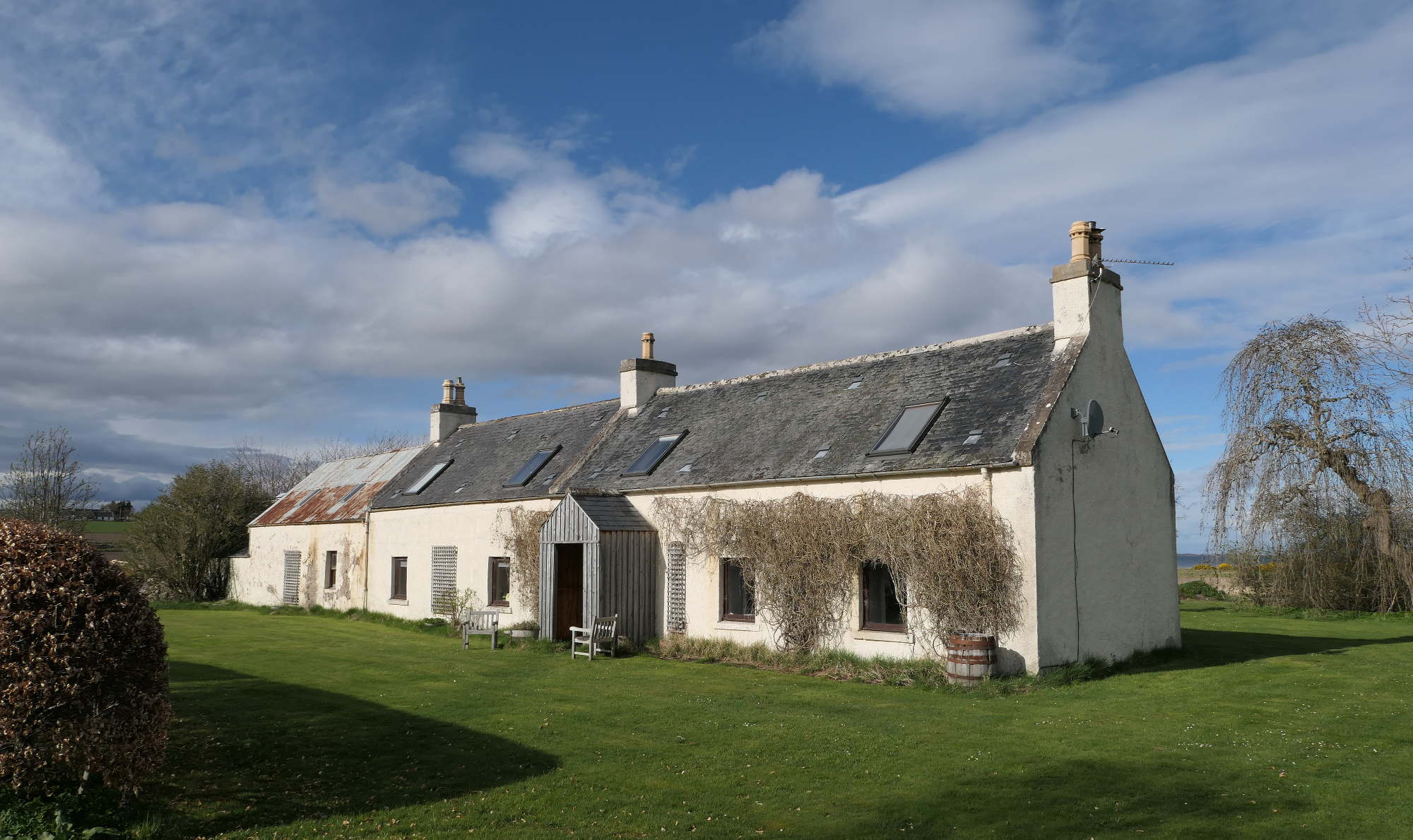
The remaining old houses at Gordon’s Mills. These houses were all owned by Reverend McCulloch. Photograph Jim Mackay
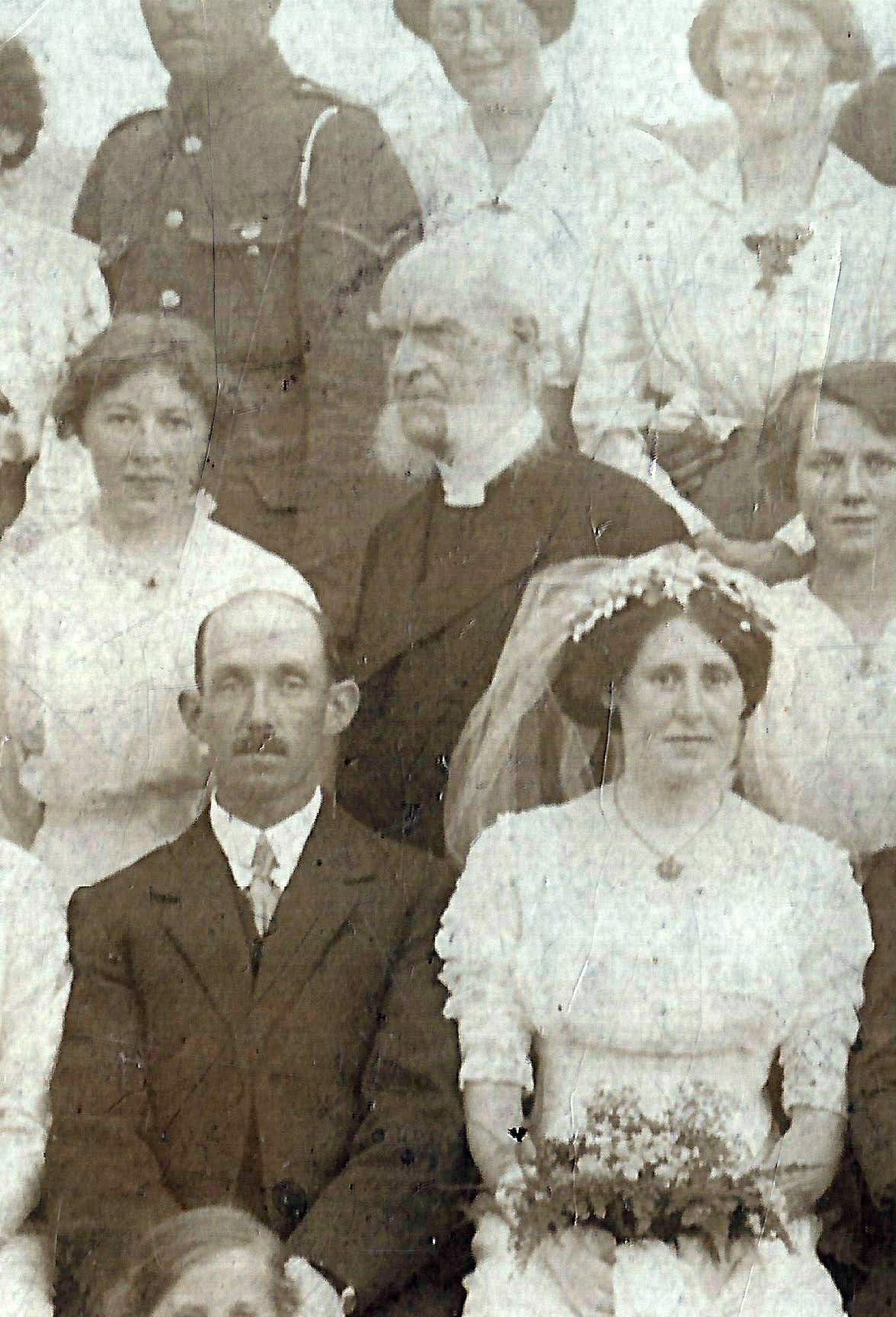
The Reverend James D. McCulloch, in 1915, from the Clark wedding photograph courtesy of Lynn Reid.
A few notes about the good minister, indicating his activity in the parish – he seemed to assist in several communions, whenever he happened to be in residence, and his name pops up occasionally.
Ross-shire Journal 22 October 1897
Rev. Mr Macculloch, of Gordon’s Mills, has kindly granted the use of the mill dam to the curlers, and, although small, it will be very convenient for practice. Insch pond, although somewhat distant, will be specially useful for matches, and can always be depended upon for early curling.
The North Star 21 July 1910
The Sacrament of the Lord’s Supper was dispensed in the Resolis Free Church on Sabbath last. The Rev. J. Maciver, minister of the congregation, has been ill for some time, and the Rev. F. Macrae, Knockbain, is acting as interim moderator. He was very ably assisted by the Rev. Principal Macculloch, Glasgow; and the Rev. J. Macdonald, Rosskeen. There were large attendances throughout. On Thursday evening the old Free Church Jamimaville, after undergoing extensive repairs, was re-opened by the Rev. Principal Macculloch, who preached to a very large congregation. A free-will offering taken at the door realised over £8 …
Clearly, with his duties in the south, the Reverend Dr McCulloch could not often be at Gordon’s Mills to manage the land himself, and he would have needed a reliable farm manager or grieve. Donald Clark must have been introduced in this role sometime between 1901 and 1911. The Clark family is described more fully on this page.
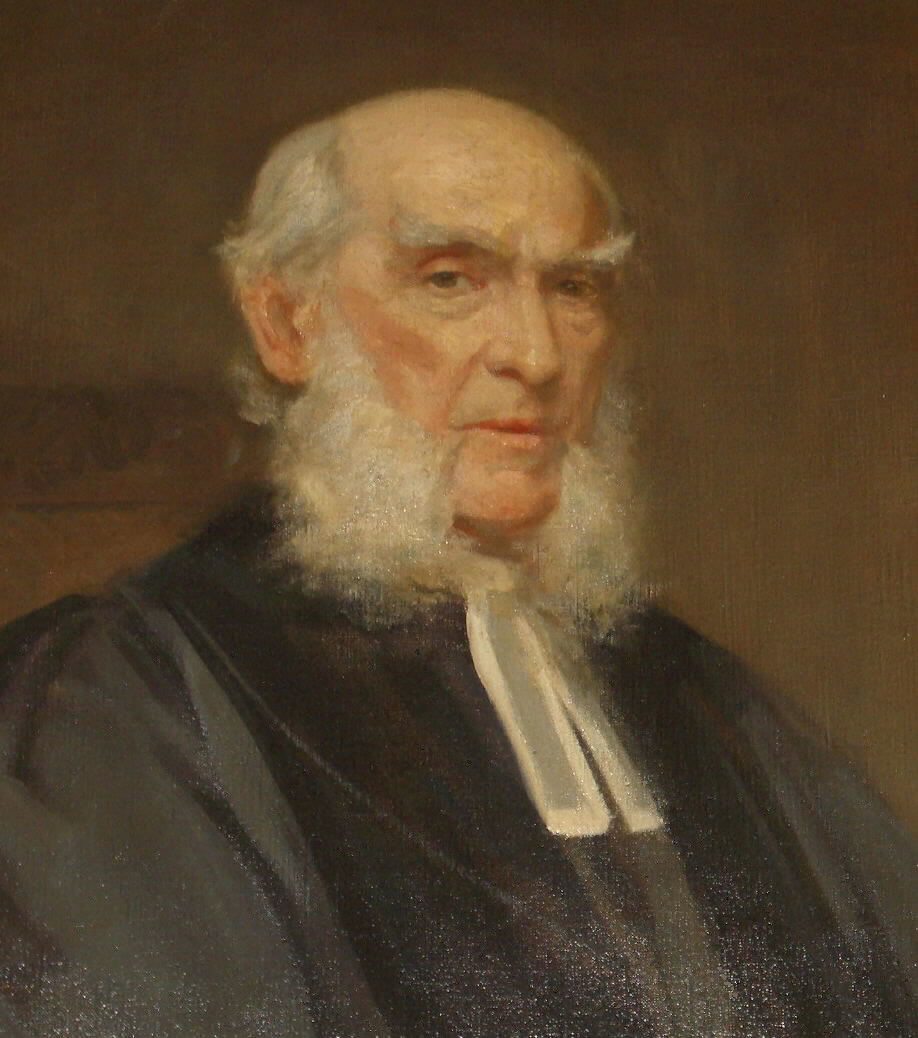
Painting of James Duff McCulloch in the Free Church College, Edinburgh
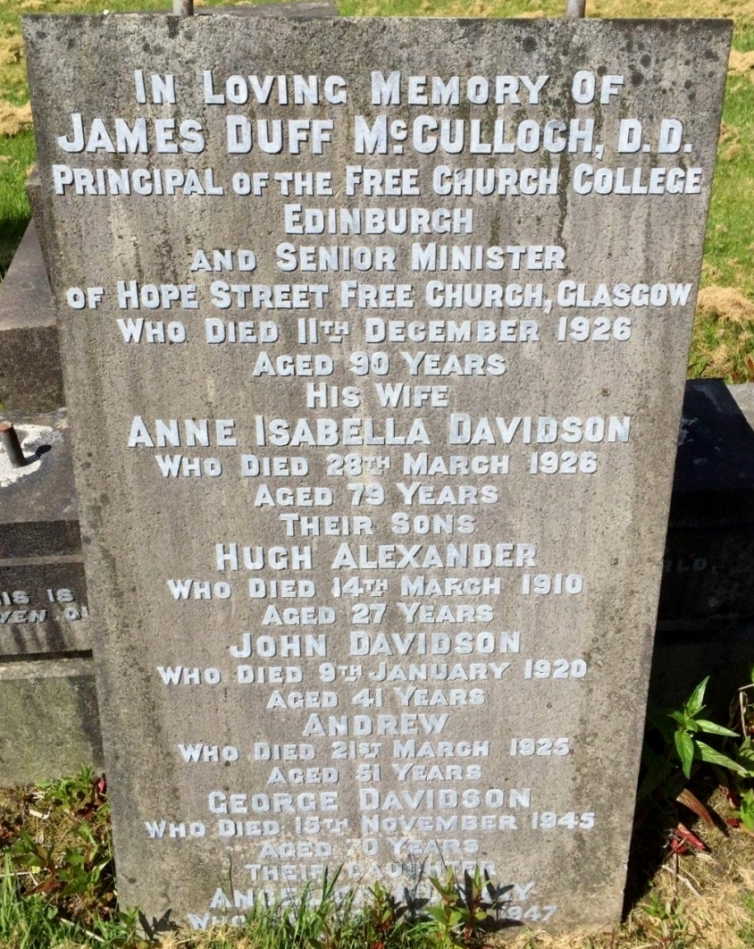
Memorial to James Duff McCulloch and his family in the Necropolis, Glasgow; photo courtesy of FindAGrave.com
The other children
This story concentrates on James Duff and Thomas due to their Resolis and Kirkmichael connections. Briefly, this is what I note about the other siblings.
Andrew (1819–) married Catherine McLean in 1843:
Logie Easter Marriage Register
Andrew McCulloch residing at Balnagore Parish of Fearn and Catharine McLean residing at Calrossie were married Decr. 26 1843.
In 1851 they are residing at Loandhu with three children (Alexander, Catherine and Janet) but thereafter I can find no trace of the family. Did they emigrate?
Janet or Jessie McCulloch (1821–1903)
Jessie married Alexander Denoon, farmer at Pithogarty, Tain, in 1861 at Loandhu, parish of Fearn. Her brother James Duff McCulloch was one of the witnesses. Alexander subsequently became a roadman. Jessie died in Fearn in 1903, and is commemorated on a tall sandstone obelisk in Tain St. Duthus.
In memory of MAGGIE DENOON died at Tain 31st Oct. 1888 aged 26 years beloved daughter of ALEXANDER & JESSIE DENOON Asleep in Jesus Also in memory of their daughter DOLINA DENOON died at Tain 9th Jan. 1898. Much regretted. At Rest. [another face] In loving memory of JESSIE MacCULLOCH wife of ALEXr DENOON died 13th Feb. 1903 Also ALEXANDER DENOON died 10th Oct. 1906.
Anne McCulloch (1824–1890)
Anne married Hugh Smith, an agricultural labourer, in the 1840s, though I cannot find her marriage – it may well be within Free Church records. It is a sad story, as Hugh died between 1851 and 1861, leaving Anne a widow with three children, Lily, Hugh and Andrew, to look after. She died in Kilmuir Easter in 1890, and I see that the informant was none other than brother Thomas, residing at this point in time close by in Bayfield:
Ann Smith widow of Hugh Smith sheep manager died 24 June 1890 at Milntown Kilmuir Easter age 62 parents Andrew McCulloch master mason (d) Catharine McCulloch ms Ross (d) informant Thomas McCulloch brother
William McCulloch (1826–1916)
William joined the police, and served as police constable, sergeant and school board officer in Abington Village, Crawfordjohn, Lanarkshire. He married Agnes Hughes Smith in 1849 at Kirknewton. William died in Kirknewton, West Lothian, in 1916, and is buried in Kirknewton Cemetery. There is a remarkable photograph to be found on the net showing the couple surrounded by their respectful 11 grown-up children!
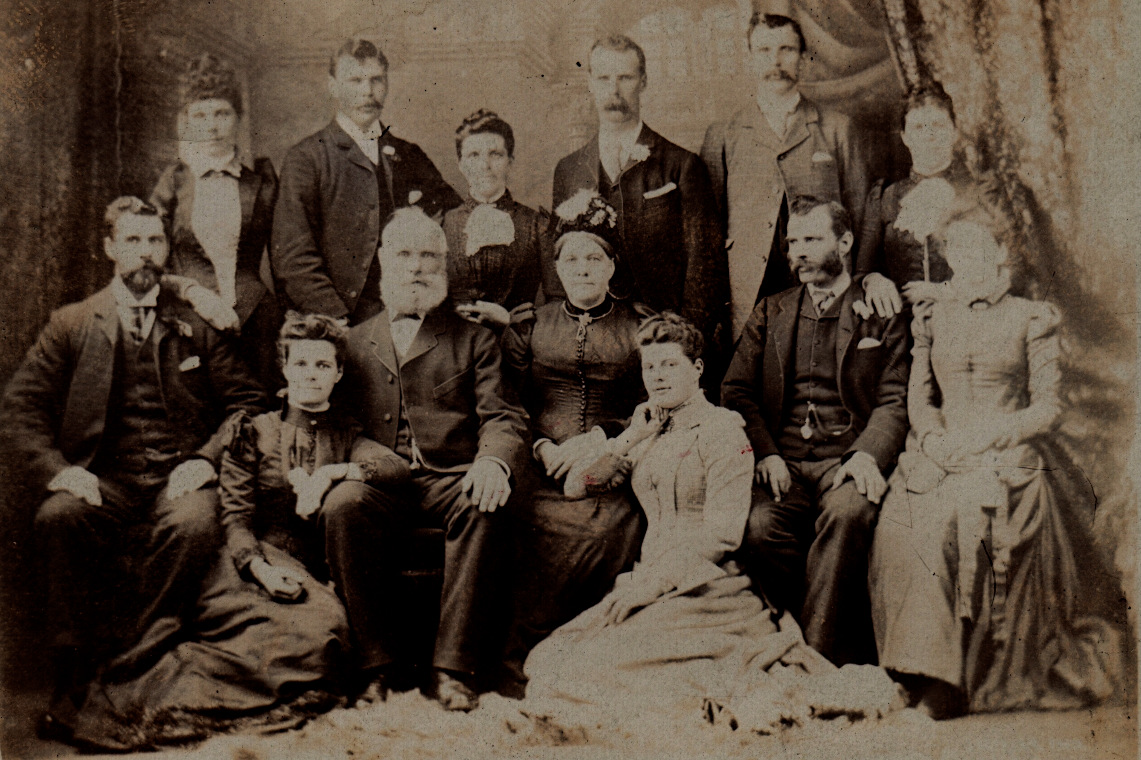
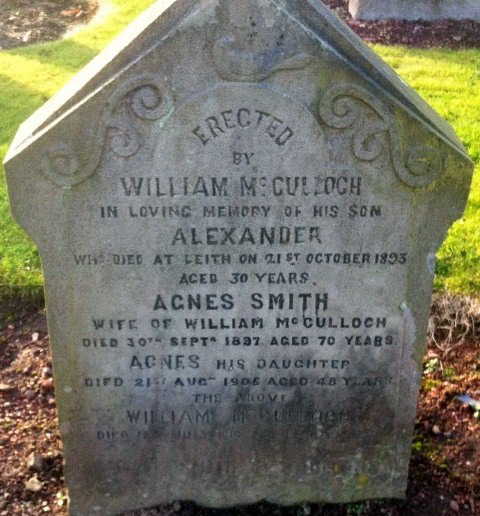
Alexander McCulloch (1830–1912)
Alexander became a grain merchant, married Jane Montgomery Gemmill in West Kilbride in 1861, and died in Newmilns, Ayrshire, in 1912.
Margaret McKenzie ms MacCulloch (1833–)
Margaret married in Cromarty, in 1859, painter Kenneth McKenzie, with her brother Thomas one of the witnesses. She gave her age as 21, when she would have been 26 at the time! I see they were in Tarbat in 1861 and 1871, with an ever-increasing size of family, and then made the jump some time before 1875 to Kelvin, Lanarkshire, where they can be seen on New City Road, with Kenneth working as a house painter, in 1881. The family then seem to disappear, as I simply cannot pick them up in 1891. I suspect they may have emigrated as I see from the net that son Andrew McCulloch MacKenzie (1862–1928) died in Hamilton, Ontario, and the 1901 census return in Ontario states that he arrived in Canada in 1885.
Catherine Graham ms McCulloch (c.1839–1919)
Catherine married crofter Angus Graham in the parish of Fearn in 1869. She died at Loandhu on the last day of the year, 1919, and is buried in Kilmuir Easter.
In memory of CATHERINE MACCULLOCH beloved wife of ANGUS GRAHAM who died at Loandhu 31st Dec. 1919 and the said ANGUS GRAHAM who died at Loandhu on 4th Octr 1927. In our Father’s house are many mansions.
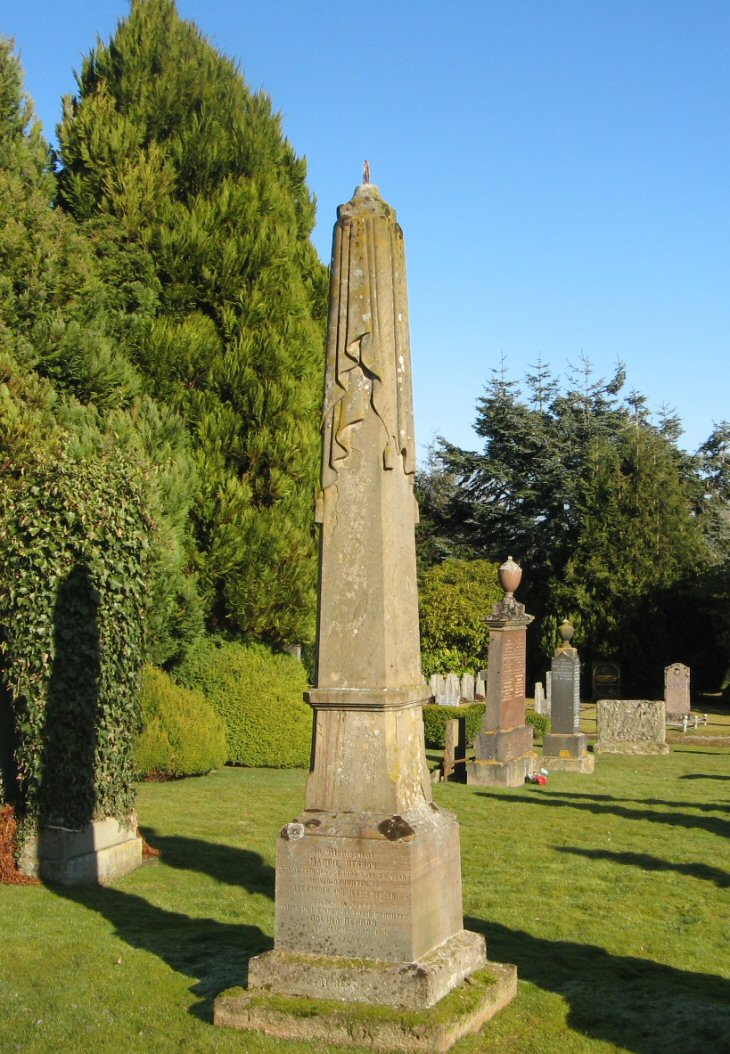
Jessie Denoon ms MacCulloch is memorialised on this obelisk in Tain St. Duthus; image courtesy of Ross & Cromarty Roots
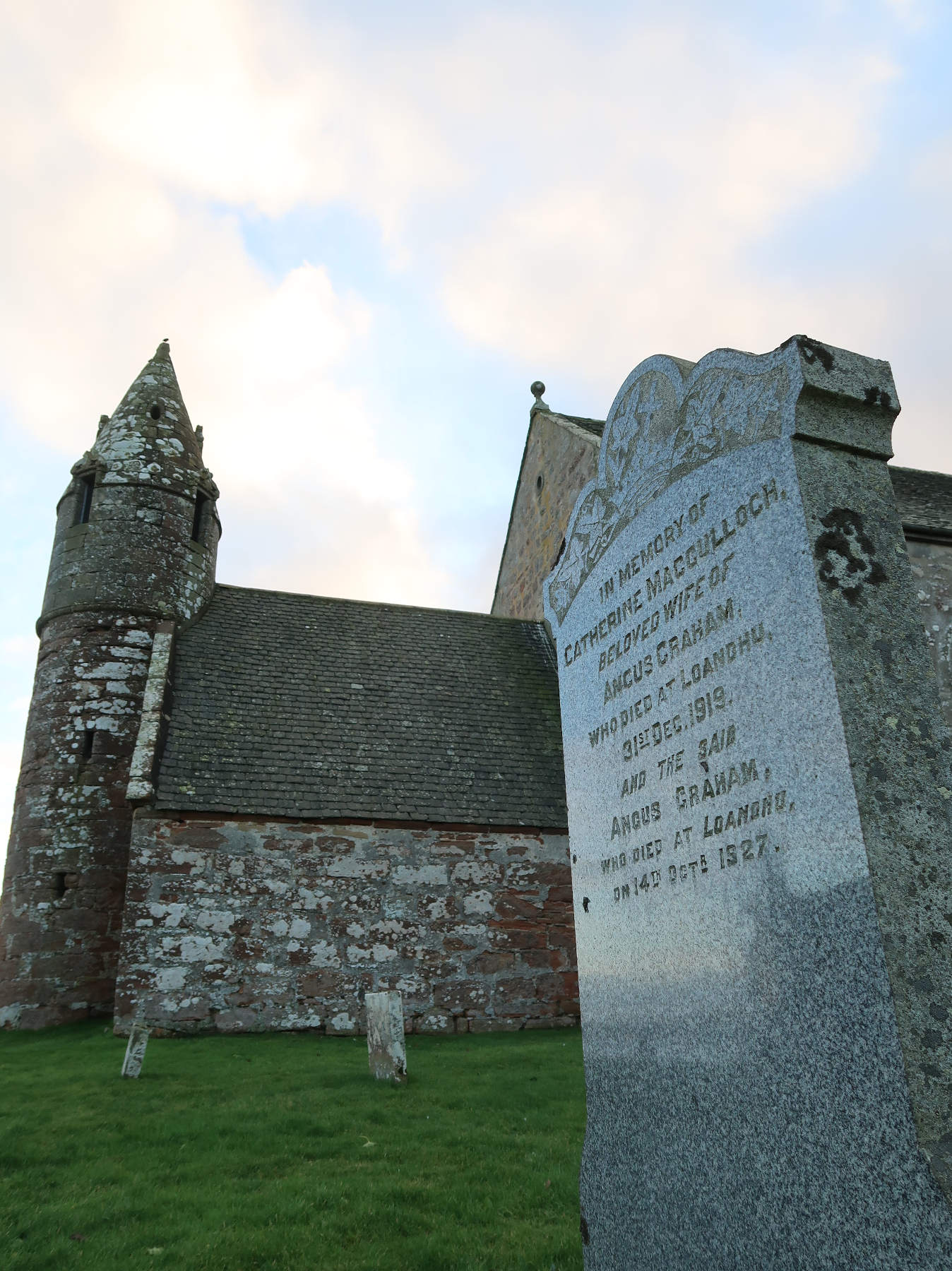
Memorial to Catherine Graham ms MacCulloch below the pepperpot tower of Kilmuir Easter; photo by Davine Sutherland